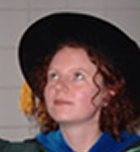University of Redlands Emergency Alert System
Alert Received: . For more information, visit: https://www.redlands.edu/alert/
University of Redlands
Professional Bio:
 Dr. Tamara Veenstra has been a member of the Mathematics Department at University of Redlands since 2001. She completed her undergraduate work at University of North Carolina at Chapel Hill and received her Ph.D. in mathematics from Dartmouth College. Her mathematical background is in number theory and she is especially interested in the applications of number theory to cryptography. She also has interests in the mathematics of origami and cryptography. She teaches a wide variety of courses in the mathematics department including lots of Calculus, Number Theory, Abstract Algebra, Linear Algebra, Geometry and her favorite course, a May term course in Mathematical Cryptography.
Dr. Tamara Veenstra has been a member of the Mathematics Department at University of Redlands since 2001. She completed her undergraduate work at University of North Carolina at Chapel Hill and received her Ph.D. in mathematics from Dartmouth College. Her mathematical background is in number theory and she is especially interested in the applications of number theory to cryptography. She also has interests in the mathematics of origami and cryptography. She teaches a wide variety of courses in the mathematics department including lots of Calculus, Number Theory, Abstract Algebra, Linear Algebra, Geometry and her favorite course, a May term course in Mathematical Cryptography.
Project Summary:
For many years the mathematics department has struggled with the rising costs of Calculus textbooks (most over $200) and the classroom technology (the software package Maple) and finding appropriate ways to keep students actively engaged with Calculus. My project aims to search for solutions all of these issues in my two sections of Calculus 1 in Fall 2015. The first part of my project will be to pilot a new online textbook, Active Calculus by Matt Boelkins of Grand Valley State University. The author has generously made this textbook available for free in a pdf format or students can order an extremely inexpensive (<$20) hardcopy. A second part of this project will be to work with my colleagues to convert many of our Calculus activities from the proprietary (and expensive) software package of Maple which students can only use on computers in the mathematics classrooms to open source alternatives such as Sage and GeoGebra that are freely available. Because the new textbook is designed to be read (actively!) outside of class another major component to my project is to develop materials to flip the classroom. I will be creating supplemental screencasts/videos and mathematical exercises using the open source WeBWorK program (an online software tool developed by the Mathematical Association of America to create mathematical exercises where students can receive immediate feedback on their understanding of the material). These activities will support students in their comprehension of the reading and development of basic calculus skills, so that class time can be used for more advanced and complex problem solving activities as well as focusing on more challenging conceptual topics.